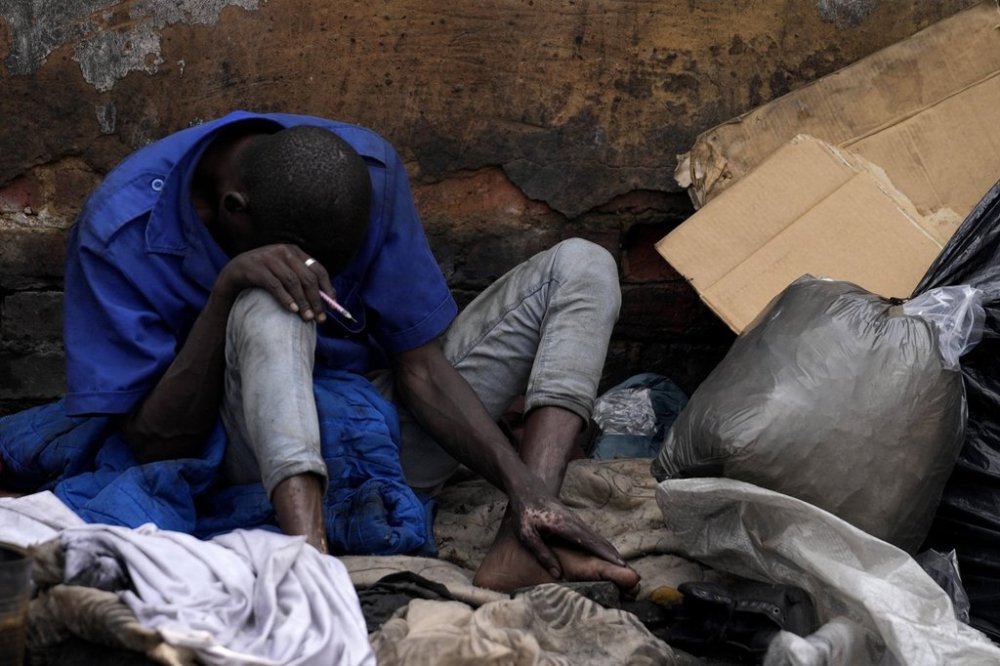In South Africa, a needle exchange program for drug users feels the effects of Trump’s aid cuts
Advertisement
Read this article for free:
or
Already have an account? Log in here »
To continue reading, please subscribe:
Monthly Digital Subscription
$1 per week for 24 weeks*
- Enjoy unlimited reading on winnipegfreepress.com
- Read the E-Edition, our digital replica newspaper
- Access News Break, our award-winning app
- Play interactive puzzles
*Billed as $4.00 plus GST every four weeks. After 24 weeks, price increases to the regular rate of $19.00 plus GST every four weeks. Offer available to new and qualified returning subscribers only. Cancel any time.
Monthly Digital Subscription
$4.75/week*
- Enjoy unlimited reading on winnipegfreepress.com
- Read the E-Edition, our digital replica newspaper
- Access News Break, our award-winning app
- Play interactive puzzles
*Billed as $19 plus GST every four weeks. Cancel any time.
To continue reading, please subscribe:
Add Free Press access to your Brandon Sun subscription for only an additional
$1 for the first 4 weeks*
*Your next subscription payment will increase by $1.00 and you will be charged $16.99 plus GST for four weeks. After four weeks, your payment will increase to $23.99 plus GST every four weeks.
Read unlimited articles for free today:
or
Already have an account? Log in here »
Hey there, time traveller!
This article was published 03/04/2025 (195 days ago), so information in it may no longer be current.
PRETORIA, South Africa (AP) — A secluded corner surrounded by litter and makeshift structures on the outskirts of South Africa’s capital is home to dozens of people with drug addiction. They inject themselves and each other with heroin-laden mixtures, some of them sharing needles.
A group of health workers has been making weekly visits to this and a dozen other places across Pretoria. In the project backed by the University of Pretoria and the Tshwane municipality, they offer the chance to exchange needles for new, sterile ones.
Needle exchange is not a new idea globally, but such efforts have been jolted by the Trump administration’s decision to kill 83% of U.S. Agency for International Development programs around the world.

In South Africa, which has more people living with HIV than any other country, treatment for people with HIV has been hit hard. Users who share needles are especially at risk of such diseases.
The team in Pretoria includes doctors and social workers who have built relationships with the drug users, encouraging them to accept an opioid-substitution therapy, and offering treatment if they have illnesses like HIV.
The need for such help is increasing. Last year, a University of Pretoria report estimated that 84,000 people inject drugs in South Africa, and in Pretoria there was HIV prevalence of 38%. South Africa’s overall HIV prevalence is over 12%, according to government data.
The report said the country’s drug market for cocaine, heroin and methamphetamine is worth about $3.5 billion, and growing.
U.S. aid cuts bring uncertainty
While the Community Oriented Substance Use Program in Pretoria is fully funded by the municipality and the university, it is indirectly affected by the shock to the global aid system. Some nonprofits that the program partners with have closed.
And at least one local health clinic that was providing services in Pretoria has closed, forcing patients to turn to often crowded, poorly funded government-run facilities.
Now, harm reduction programs like the Pretoria one for drug users will face stiff competition for sharply shrinking resources.
Regrets and hope
As doctors did consultations, Phumulani Mahlangu expressed regret for his situation. The 30-year-old said he is addicted to a heroin mixture locally known as nyaope. He is homeless and has three children in his hometown nearly 200 kilometers (124 miles) away.
“In 2013, I experienced with nyaope with friends. I never felt such relaxation before,” he said as he prepared a syringe. “I started spending my own money on it and that’s how I got here.” He takes part in the needle exchange.
Dipolelo Lekota is one of the few female drug users at the site. The 30-year-old said she was struggling to quit drugs so she could take care of her child, who is with relatives.
She said she can access HIV medication and clean needles through the visiting project to avoid infecting others.
Withdrawal pains
Likwa Ncube leads the project in parts of Pretoria. He acknowledged that drug withdrawal can be painful as people accept methadone instead.
“It’s not an easy thing to deal with,” he said. The challenge is helping them through it.
Ncube said the program, like similar ones elsewhere in the world, had been unfairly accused of enabling or encouraging drug use because it provides needles.
“It can be viewed as if you are enabling somebody to use, but we can have the same argument with condoms,” he said. “When we distribute condoms, are we saying we are encouraging people to have sex?”
___
For more on Africa and development: https://apnews.com/hub/africa-pulse
___
The Associated Press receives financial support for global health and development coverage in Africa from the Gates Foundation. The AP is solely responsible for all content. Find AP’s standards for working with philanthropies, a list of supporters and funded coverage areas at AP.org.

